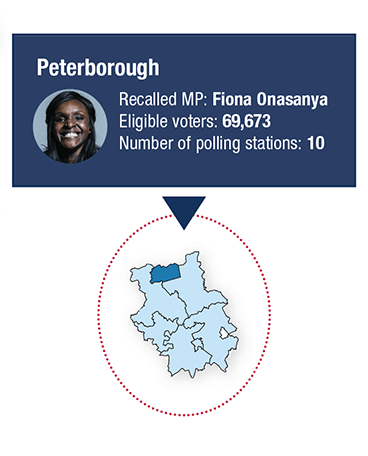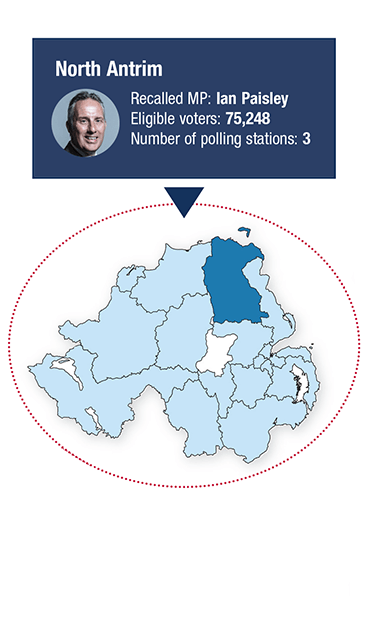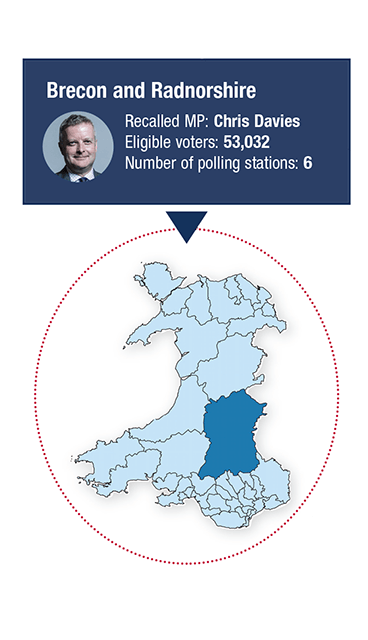Recall petition

In July 2018, DUP MP Ian Paisley became the subject of the UK’s first recall petition following his suspension for 30 parliamentary sitting days. The recall petition is one of three to have taken place since the procedure was introduced in 2015 and the subject of a report by the Electoral Commission on the conduct of the petition.
Introduced as a response to the MP’s expenses scandal in the run up to the 2010 General Election, the recall procedure allows for the recall of an MP under three strict criteria:
- if convicted in the UK of an offence and sentenced or ordered to be imprisoned or detained and all appeals have been exhausted;
- if suspended from the House following report and recommended sanction from the Committee on Standards for a specified period (at least 10 sitting days, or at least 14 days if sitting days are not specified); and
- if they are convicted of an offence under section 10 of the Parliamentary Standards Act 2009 (making false or misleading Parliamentary allowances claims).
In the case of Paisley, a recall petition was triggered in July 2018 after the House of Commons agreed to suspend the North Antrim MP for 30 parliamentary sitting days for breaching the Code of Conduct for MPs. An investigation by the Parliamentary Commissioner for Standards concluded that Paisley had engaged in paid advocacy through a letter to the Prime Minister and failed to declare in the letter “the benefits he and his family received from the Sri Lankan Government”. The House of Commons Committee on Standards recommended suspension and the first recall petition against an MP was triggered in July 2018 after the House of Commons agreed to suspend Paisley.
Although the petition did not attract the required number of signatures to recall Paisley, it was the focus for a statutory report on the conduct of the petition. A main focus of the report was around criticism that had been raised that only three out of a possible 10 signing places were opted for by the petition officer. In the two recall petitions which have occurred since that of Paisley’s, at least double the amount of signing places have been opened despite North Antrim having the largest number of eligible voters.
The Electoral Commission reported that it had seen no evidence that “an increased number of signing places would have contributed to a different result at the end of the recall petition”, but noted the difference compared to the 53 polling stations used in the constituency during the last election.
Critics have argued that greater generosity of provision may have made a difference and also pointed to the impact of the “sectarian geography” of the constituency. Jonathan Tongue, Professor of politics at Liverpool University noted that two signing stations were in predominantly Protestant and unionist towns and one was in a predominantly nationalist and Catholic town and argues that the siting of such stations was arguably important.
Based on the initial recall petition, the Commission made recommendations for improving or clarifying some aspects of the recall process. These included a review of the length of the six-week process on the back of petition staff feedback that the process was too long. It also recommended a review of the daily verification process to allow for independent observers to witness the process. The Commission noted that under the current legislation, the opportunity to observe proceedings at a recall petition is limited. On the back of the North Antrim petition, the Commission concluded it would be helpful if the Government clarified its rationale for limiting the observation of petition processes.
Other recommendations included:
- clarifications in relation to the close of the count on the final day, when counting should commence and provision to how the Speaker should be notified of the result and in what form the notification should be made. Similarly, there is no provision to notify the MP who is subject to the recall petition of the result;
- the Commission recommended reviewing access to the marked register to ensure the appropriate balance is struck between maintaining secrecy and challenging fraud; and
- on review that the prohibition of exit polls “caused concern and confusion among campaigners, the media and the public”, the Commission recommends that “it would be beneficial if more clarity and guidance on this provision was put in place ahead of any future recall petitions.”








